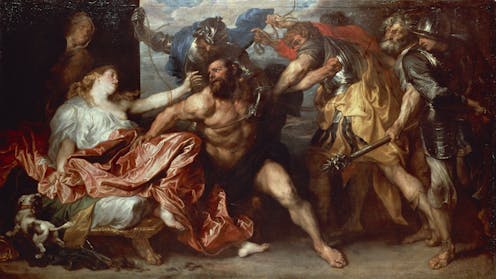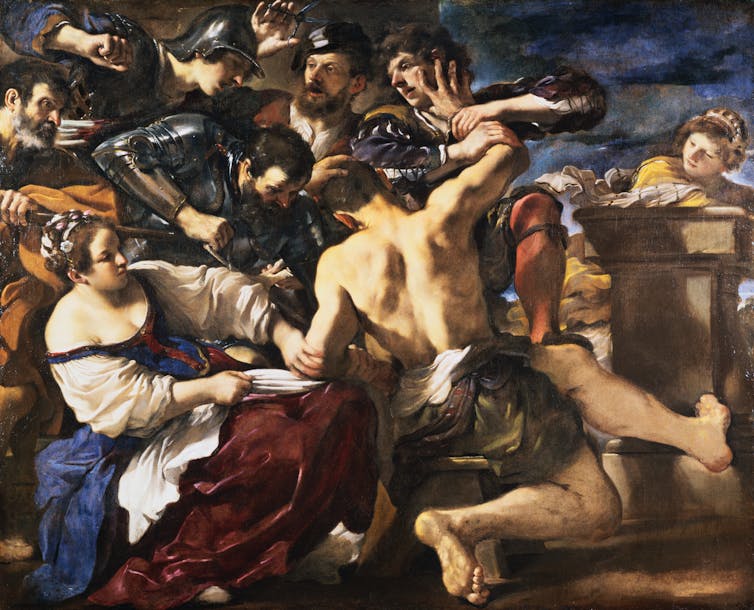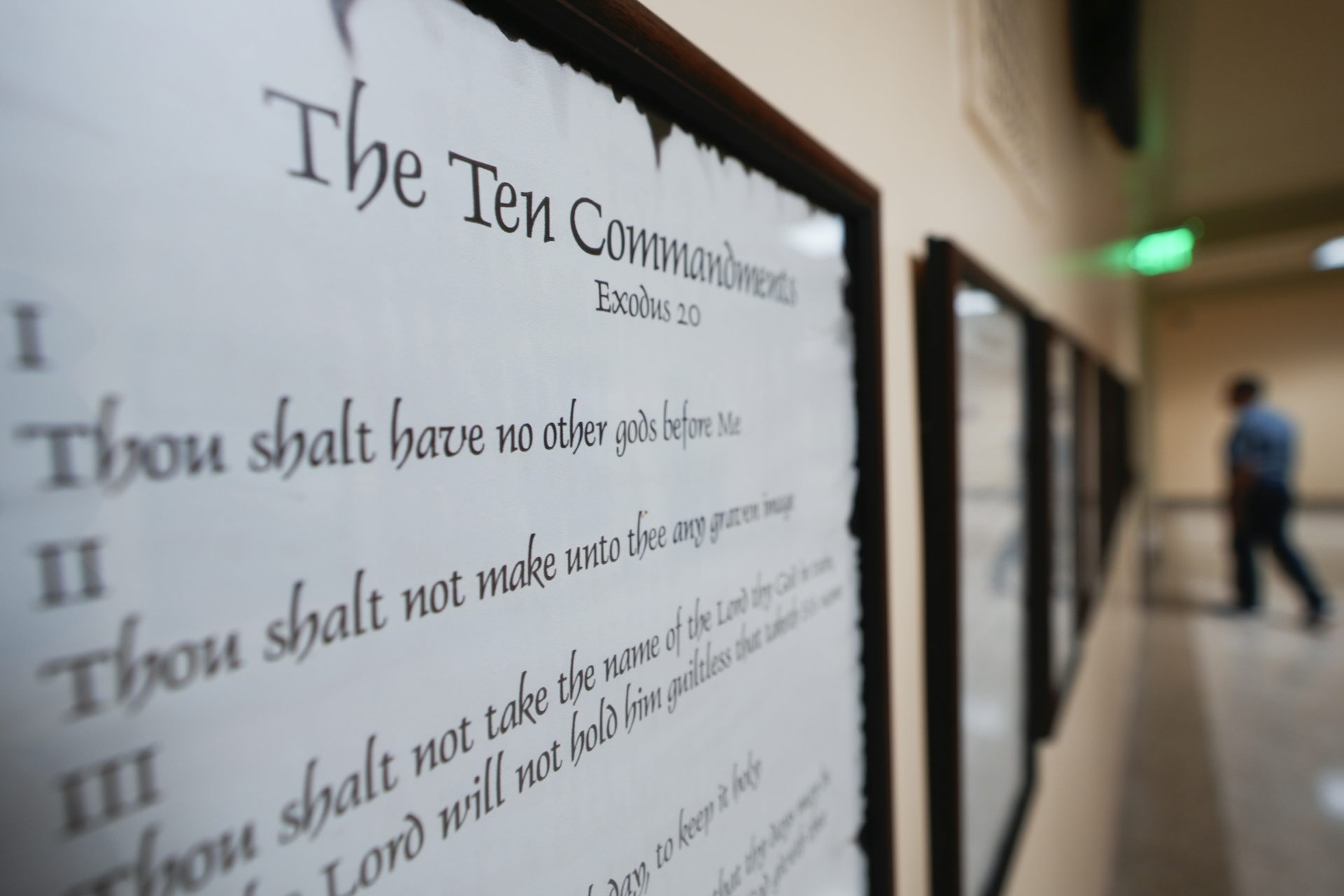Beyond brute strength: A fresh look at Samson’s search for intimacy in the Hebrew Bible
While the biblical figure of Samson is often characterized as driven by poor judgment, a Hebrew Bible scholar argues why he could instead be interpreted as a figure of emotional complexity.

The biblical figure of Samson has long been understood as a man of brute strength, a warrior on the margins of society whose story is often defined by violence and destruction. Yet alongside his strength, Samson is known for his entanglements with women.
Samson’s story is told in the Book of Judges, Chapters 13-16. In the biblical context, judges were not legal authorities but leaders meant to rescue the Israelites from oppression. Samson is one such judge, chosen by the deity before birth to deliver the Israelites from Philistine rule.
With his enormous strength, Samson performs extraordinary feats, including slaying a lion with his bare hands and massacring a Philistine army with a donkey’s jawbone.
He is feared by both Israelites and Philistines; he engages in acts of destruction without clear goals. He often acts against the Philistines not in defense of the Israelites, but due to personal grievances. He eventually dies alongside his enemies, the Philistines.
Many scholarly and theological interpretations highlight his impulsive nature. Even as a heroic, superhuman and legendary figure, Samson is not often viewed as a role model, but as someone driven by unchecked appetites and poor judgment.
But the story of Samson is defined also by Samson’s failed search for companionship. Samson attempts to marry a Philistine woman who betrays his trust. Later, he famously falls in love with Delilah, a woman who learns the secret of his strength and has his hair cut, robbing him of his power and leading to his capture.
In my work as a Hebrew Bible scholar, I read the text through the lens of intimacy. I argue that the text, as much as it emphasizes Samson’s violence, also emphasizes his emotional depth and search for romantic connection.
Stronger than a lion
Spurning social norms and the wishes of his parents, Samson, who was born to an Israelite mother, decides to marry a Philistine woman. At the wedding, he poses a seemingly lighthearted riddle to those gathered. He wagers 30 linen and festal garments with the guests that they won’t be able to solve it.
Prior to the wedding, Samson had encountered a lion on the road and, through sheer strength, killed it with his bare hands.
Later, he found something equally remarkable: Bees had made honey within the lion’s remains. Rather than sharing this discovery with others, Samson kept it to himself, eating the honey in silence.
This hidden act provides the foundation for the riddle he presents to the Philistines: “Out of the eater came something to eat, out of the strong came something sweet.”
Because Samson has told no one about this act, the Philistines cannot solve Samson’s riddle. Not wanting to lose the wager, they coerce his bride into betraying Samson’s trust. Under threat, she pushes for Samson to reveal the answer to her.
Seeing her distress and need for the answer to his riddle, Samson gives her the key to understanding his riddle. She then conveys theses “answers” to the Philistines, who then presumably repeat the words he had spoken to her back to him: “What is sweeter than honey? What is stronger than a lion?”
Samson’s intimacy and betrayal
These “answers” are odd. Not only are they questions, they are only a partial answer to Samson’s original riddle. Additionally, rather than being rhetorical questions, which both Samson’s bride and the Philistines assume them to be, both questions have definite answers.
Samson himself is stronger than a lion – he proved this when he killed one with his bare hands. And the question of “what is sweeter than honey?” should not be viewed as rhetorical either. While biblical texts sometimes liken honey to wisdom or divine instruction, these explanations do not fully align with Samson’s context. He is not asking about abstract virtues or knowledge; his riddle was spoken to his bride in an intimate setting.
Ancient Akkadian love poetry, written in ancient Mesopotamia potentially alongside many of the stories in the Hebrew Bible, repeatedly describes love and intimacy as being “sweeter than honey.” Lovers describe their passion in this way to evoke both physical pleasure and emotional connection.
With this in mind, I argue that Samson is attempting to express something personal and meaningful to his bride. When she pushes him for the answer to his riddle, he instead poses a new riddle to her alone: Two questions with definite answers – answers she should know if she is going to be his bride.
In effect, he’s saying, “I am stronger than a lion, and our love will be sweeter than honey.” His use of language is not that of a brute but of a man trying to forge a connection through poetic expression.
Yet his bride cannot answer the questions. She immediately betrays him, repeating the same questions he presented to her back to the Philistines who had threatened her. When the Philistines repeat his words back to him, they strip them of their intimacy, turning them into public mockery.
The narrative, then, does not present Samson as merely a violent strongman but as a thoughtful figure who uses language to seek connection.
Vulnerability and intimacy
Unlike other judges in the Hebrew Bible, Samson does not lead an army, unite Israel, or receive divine commands in the traditional sense. Instead, he operates in near-total isolation, a figure alienated by his divine strength.
This isolation is mirrored in his relationships. After the incident with the riddle, Samson leaves and his Philistine bride is married to another man. This first attempt at marriage is overshadowed by secrecy, betrayal and coercion. His bride is manipulated by the Philistines, forced to extract the answer to his riddle under the threat of violence.
Even in his final relationship with Delilah, Samson displays a striking willingness to trust after a lifetime of betrayal.
In Judges 16, Delilah asks Samson repeatedly to reveal the secret of his strength, and each time he gives her the wrong answer. This back-and-forth seems to be a game between them. He tells her a false answer and she uses it against him, attempting to have him captured by the Philistines.

After three such attempts, each one ending with an ambush, Samson still remains with her. Eventually, he reveals that his strength is tied to his uncut hair. The deity had ordered that Samson not cut his hair, and here Samson reveals that it is the source of his divine strength.
This moment of confession following clear signs of manipulation from Delilah, in my reading, is not foolishness – it is a final act of vulnerability, a deliberate choice to seek intimacy despite the cost. His relationships are not simply careless indulgences; they reflect a deep desire to be known and loved for more than his strength, even in the face of danger.
Rethinking Samson’s story
By reevaluating the Samson narrative, readers can move beyond the one-dimensional portrayal of him as an overly masculine, violent brute.
His story is not just one of strength but also of longing, intimacy and deep emotional vulnerability. His riddle may not be a challenge meant to humiliate his enemies, but an expression of personal connection, one that is ultimately betrayed.
Tanner Ethan Walker does not work for, consult, own shares in or receive funding from any company or organization that would benefit from this article, and has disclosed no relevant affiliations beyond their academic appointment.
Read These Next
Detroit was once home to 18 Black-led hospitals – here’s how to understand their rise and fall
In the early 20th century, Detroit’s Black medical professionals created a network of health care…
Pittsburgh nurses are fighting for better staffing ratios — and the research backs them up
As nurses in Pittsburgh and nationwide spotlight staffing shortages, better pay and workplace safety,…
Baptists have helped shape debate about religious freedom for over 400 years – up to today’s 10 Comm
The phrase ‘separation of church and state’ dates back to a letter from Thomas Jefferson to a Baptist…





